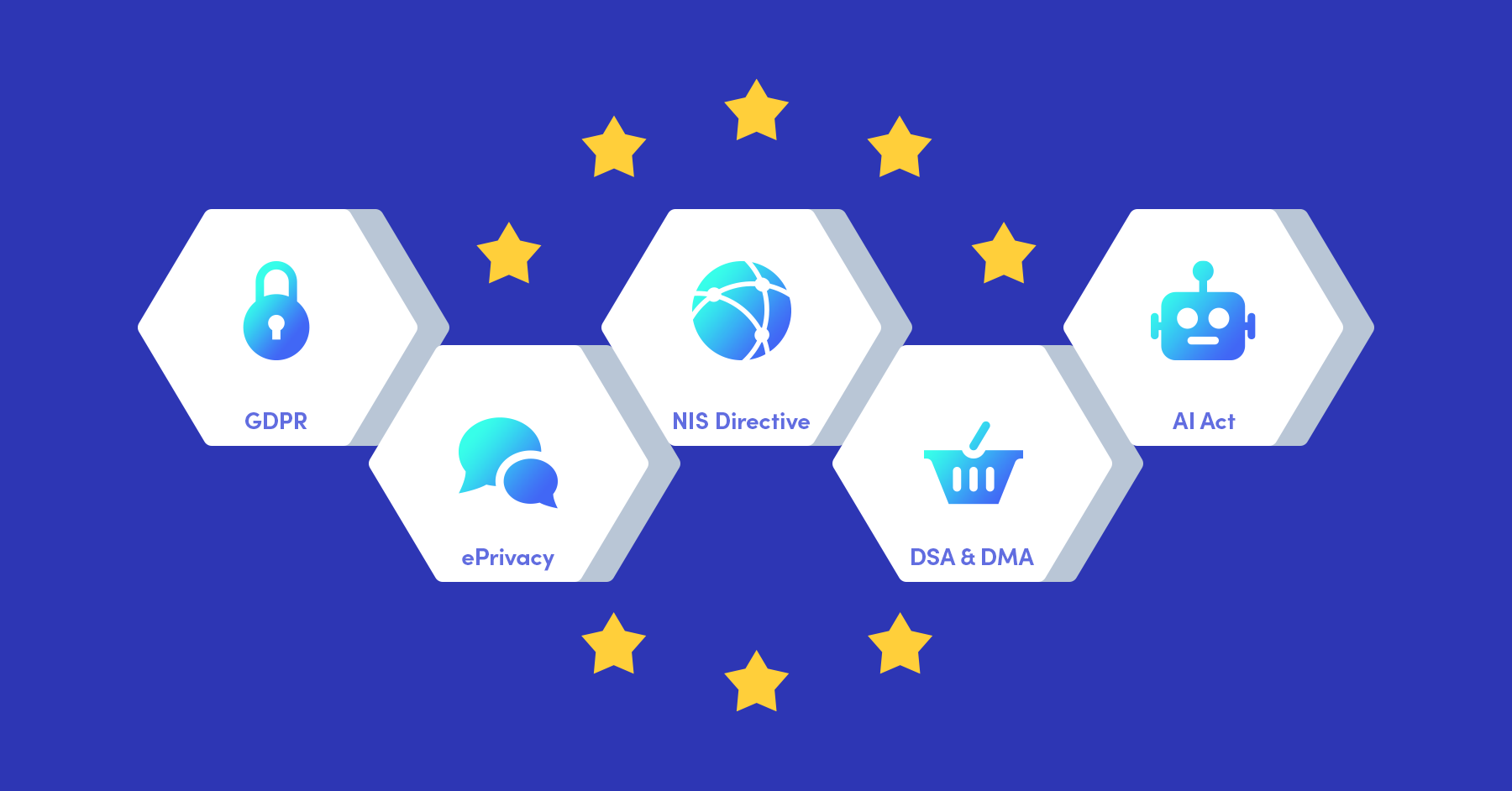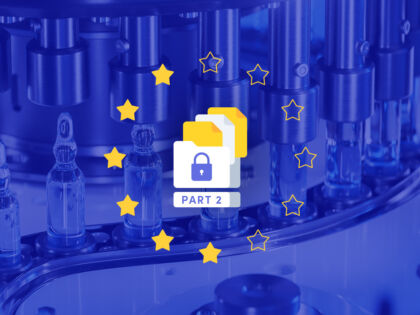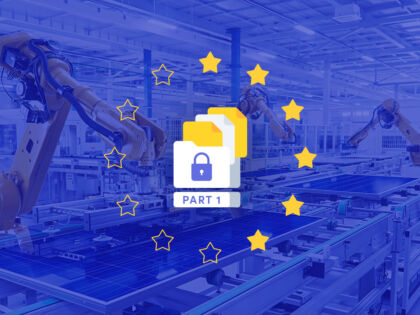Amidst this transformative journey, however, lurks a paramount consideration— the stringent data and digital regulations meticulously outlined by the European Union (EU). These regulations, encompassing not only the famed General Data Protection Regulation (GDPR) but a constellation of acts and directives, fundamentally redefine how manufacturing entities engage with data in our interconnected world.
Navigating this complex regulatory terrain is imperative for companies seeking not only legal compliance but strategic resilience. Our exploration delves into the core of EU data and digital regulations, shedding light on their diverse facets. Here's a brief overview of the key acts shaping this landscape:
- General Data Protection Regulation (GDPR): The cornerstone of data protection, emphasizing individual privacy rights and secure data handling.
- ePrivacy Directive: Focusing on privacy in electronic communications, influencing how companies approach online communications and marketing strategies.
- Directive on Security of Network and Information Systems (NIS Directive): Mandating a coordinated approach to cybersecurity, ensuring the resilience of essential services.
- Digital Services Act (DSA) and Digital Markets Act (DMA): Addressing the challenges posed by digital platforms, ensuring fair competition, user protection, and oversight of large online platforms.
- AI Act (Artificial Intelligence Act): Setting out a comprehensive regulatory framework for artificial intelligence, fostering innovation while ensuring fundamental rights and safety.
Understanding and complying with this multifaceted regulatory framework is not just a legal necessity; it's a strategic imperative shaping the very fabric of the manufacturing industry's digital future. Join us as we dissect these regulations and unravel their profound implications for manufacturing and industrial sectors.

Understanding the EU Data and Digital Regulations:
To navigate the intricate landscape of manufacturing and industry in the digital age, understanding the bedrock of EU data and digital regulations is paramount. At the forefront stands the General Data Protection Regulation (GDPR), an expansive framework designed to protect individuals' privacy rights and establish stringent protocols for the processing of personal data. This regulation, introduced in 2018, serves as a lodestar for businesses, mandating transparent data practices and empowering individuals with control over their information.
Complementing GDPR is the ePrivacy Directive, a directive focused on privacy in electronic communications. It intricately shapes how manufacturing companies approach online communications and marketing, intertwining digital outreach with a commitment to safeguarding user privacy.
Simultaneously, the Directive on Security of Network and Information Systems (NIS Directive) establishes a collective approach to cybersecurity. It requires manufacturing entities to fortify their digital infrastructure, ensuring the robustness and resilience of essential services in an interconnected world.
Expanding the regulatory ambit, the Digital Services Act (DSA) and Digital Markets Act (DMA) target challenges posed by digital platforms. These acts usher in a new era of oversight, ensuring fair competition and heightened user protection in the expansive realm of online platforms.
Adding another layer to this intricate regulatory tapestry is the recently introduced AI Act (Artificial Intelligence Act). This legislation outlines a comprehensive framework for the development and use of artificial intelligence, balancing innovation with safeguards for fundamental rights and safety.
In essence, grasping the nuances of these regulations is not merely a compliance exercise; it's a strategic imperative that shapes the ethical and operational foundations of manufacturing in the digital realm. Join us as we delve deeper into the implications of these acts and their collective influence on the manufacturing and industrial sectors.
Significance and Implications for Manufacturing Companies:
EU data and digital regulations significantly reshape the daily operations of manufacturing companies, elevating compliance from a legal obligation to an intrinsic component of ethical and operational excellence. The General Data Protection Regulation (GDPR) revolutionizes how manufacturers handle customer data. Implementation requires transparent data practices, impacting customer relationship management systems and supply chain data sharing. Manufacturers must adopt secure data processing mechanisms to ensure GDPR compliance, safeguarding not just legal standing but also customer trust.
Simultaneously, the ePrivacy Directive molds communication strategies within manufacturing. In an era where digital communication is integral to operations, compliance becomes crucial. This directive influences marketing approaches, email communications, and online interactions. Adherence not only prevents legal ramifications but also establishes a trustworthy relationship with consumers, an indispensable asset in a climate where data privacy is paramount.
The Directive on Security of Network and Information Systems (NIS Directive) demands a transformative approach to cybersecurity for manufacturing entities. Daily operations now involve rigorous cybersecurity measures to protect essential services from potential threats. This spans securing network infrastructure, monitoring data flows, and implementing incident response protocols. Non-compliance not only risks legal consequences but also endangers the daily operational continuity of critical services.
For manufacturing companies engaged in digital services, the Digital Services Act (DSA) and Digital Markets Act (DMA) introduce a new norm. Daily operations now include adherence to rules governing online platforms, ensuring fair competition and user protection. Compliance becomes integral to digital marketing strategies, customer engagement on platforms, and strategic partnerships.
The AI Act (Artificial Intelligence Act) casts its influence directly into daily operations involving AI technologies. Manufacturers leveraging machine learning algorithms must navigate the regulatory landscape to ensure ethical AI deployment. This extends to the use of AI in production processes, quality control, and predictive maintenance, necessitating a balance between innovation and regulatory compliance.
In essence, these regulations weave into the fabric of daily manufacturing operations. Beyond avoiding legal consequences, compliance becomes synonymous with ethical, resilient, and competitive practices. Join us as we delve deeper into how these regulations manifest in the day-to-day strategies and operations of manufacturing companies navigating the complexities of the digital age.








